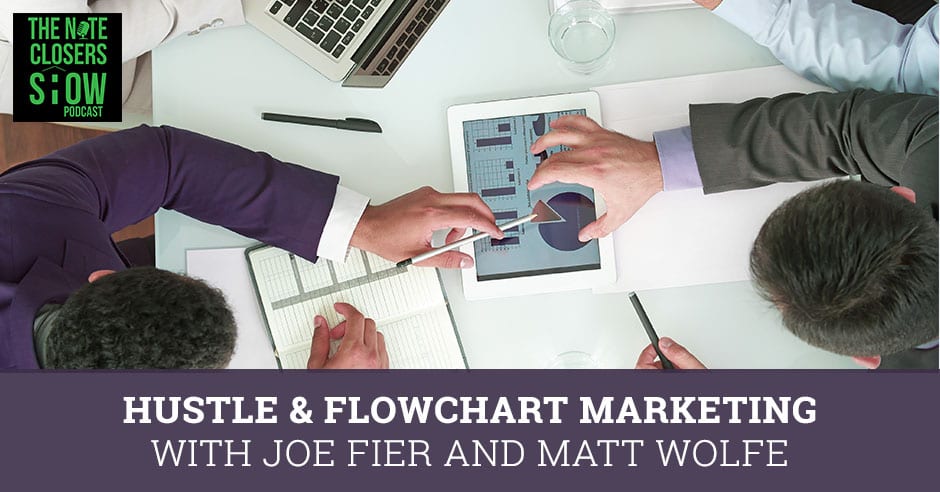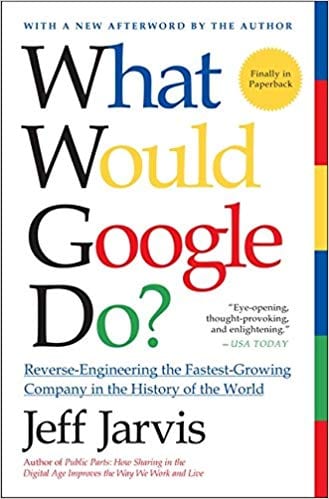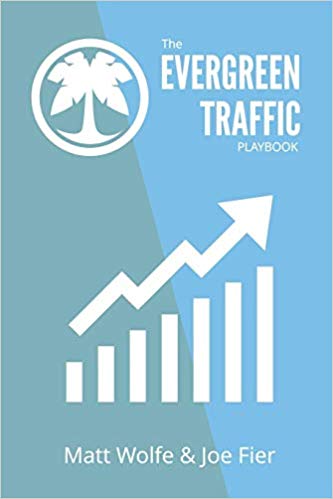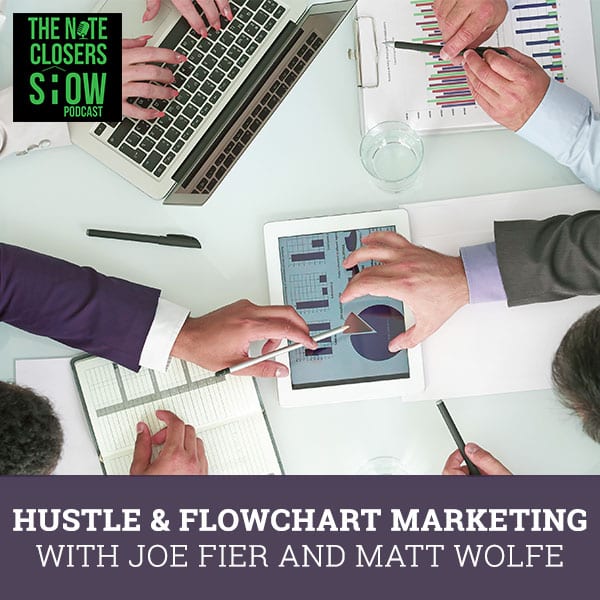
—
Listen to the podcast here
Hustle And Flowchart Marketing with Joe Fier and Matt Wolfe
I am honored to have a couple of cool guys on here who are going to share some nuggets. It’s a podcast that I’ve been bingeing a lot lately and these guys celebrated a special anniversary. These guys are absolutely killing it with some of the things they’re doing. Those things they’re doing, you can apply to your real estate business. You can apply it to any business out there. What’s so great is these guys are truly devouring other people’s successes, other people’s tips, and bringing and implementing themselves and they’re also sharing it to the audiences out there as well. We’ve got Joe Fier and Matt Wolfe. They are the Co-founders of Evergreen Profits and The Hustle and Flowchart Podcast.
They absolutely love showing how simple it is to get online in competitive industries. They get pumped up to share their system of driving targeted traffic that turns into leads and sales for business owners who want to scale but have failed in the past. They are an agency but pretty much an anti-agency up there as well. Joe and Matt started in business together years ago. They haven’t stopped learning, testing and scaling since they educate on paid traffic, content marketing, SEO and branding omnipresence as well. They’re also super affiliates, generating over seven figures per year in affiliate revenue. What is up, guys? I’m so excited to have you on the Note Closers Show.
Thanks, Scott.
This is going to be a fun time.
You guys are at San Diego. You’re out there on the non-burned side. Twelve years, that’s awesome. That’s a great partnership. Each of you guys is the yin and yang. Do you want to talk a little bit about that?
Matt and I started back in his parents’ shutter company. They’re on window shutters interior stuff and Matt basically was running the show there with his parents. I was running phones and stuff but on the off time we started blogging, we started making some money with ads and it went from there. Our personalities are different but we share the common goal where we’re headed. It’s an interesting partnership. It’s like our show, Hustle and Flowchart. I’m more of the hustle and he’s more of the flowchart analytical. It’s a cool little mash when you have a shared goal.
Joe tends to be more the extroverted, networker, “Get out there and chat with people, bring on new connections, find new people for the podcast, get us on other people’s podcast,” things like that. I tend to be more like heads down, “Leave me alone, I’m going to build some Facebook ads, don’t talk to me for two days.” I’m a techie. I want to build stuff.
We met at the New Media Summit where all of us were icons of influence. We got a chance to hang out a little bit. We were on International Podcast Day together, some things like that as well. You are big students of traffic. You’re helping people drive traffic after you go out and test the things yourself. I’ll start first with you, Matt, on this since you’re the one building a lot of that stuff, what are some of the easiest things that entrepreneurs can put together to get into the digital age or things that can help to drive traffic to their website or their product or things like that?
We teach a handful of traffic strategies. We have one core strategy that we teach the most. It’s what our newest book is all about as well. We have a strategy we call the perpetual audience growth strategy. Essentially what it is, is you start with Google search ads. Once people view your content, you retarget those people with Facebook ads, Google display network ads and YouTube retargeting and you retarget them everywhere. With the Google Ads, you’ve got to look at Google and Facebook and the intention of the two platforms. Let’s just use the real estate niche. When somebody goes to Google and they search for homes in San Diego, there’s a good chance they’re looking to purchase a house. Maybe they’re in the market for it. Maybe they’re real estate agents. They’re looking for new listings to show their clients whatever. They’re looking for that information specifically.
When somebody is going on Facebook and they’re scrolling through their news feed, they’re just trying to catch up with friends and family. They are trying to see what other people are up to. They’re not in this buyer mode. They’re not there thinking, “I’m looking for something specific,” but on Google, they are. We think Google is the best cold traffic source to find people who are looking for what you offer. We start with Google search ads. We tell everybody to go and build some Google search ads. Start with your brand name. If somebody is searching for that Note Closers Show, run an ad to that. It will be cheap. You’re the only person advertising on it probably, but it will always make sure you show up at the top. Nobody else is going to pass you on it because you’re running an ad to it. Other keywords that people would search for that you want them to search for to find your business, you want to rank for those as well using Google ads. Send in the content, once they viewed the content, then you use every other ad platform out there to retarget them. It looks like you’re everywhere.
Use one thing and repurpose it across the board for the most part they can.
The idea is once they search for something on Google and they read your content, then they’ve raised their hand and said, “I am interested in finding help for this problem.” Now that they’ve raised their hand and said, “I need help with this problem,” all of a sudden, they’re seeing you everywhere. They think you’re the biggest brand on the internet in that specific niche because now you’re retargeting them all over the place.
I want to clarify retargeting, a lot of folks don’t know what that is. The whole thing is if you can get someone to land on your website, no matter what site you have, there’s a little piece of code you could put in there you can get from Google, Facebook or other platforms that drops a little cookie on them. When someone visits and reads an article, that’s typically the first touch that we like to have. Lead with value is what we’re always talking about. You’re also getting folks to raise their hand and you’re essentially tagging them, so you can follow-up with them later on these other platforms. The big a-ha is you start with Google because they’re very intent on a specific thing. Pair it up with some content and then now you’re everywhere to these people online, no matter where they’re at.
It looks like you’re spending a ton of money on the budget, but it could be $10 a day, $50 a day. You work the math out like, “What kind of profit margin do I have when I’m closing notes?” or when you’re selling a house or whatever. You reinvest some of that in your ads and your content. We have a lot of real estate folks actually in our training and that’s the big a-ha. You bring in these qualified eyeballs, either selling a house or buying a house, you get those sides of that segment with content.

Hustle And Flowchart: Always lead with value.
What do you think the biggest a-ha is, Joe? People that are coming through in my workshop, is it they think it’s more difficult than they think it is or what other things do you hear?
The a-ha is that multi-platform approach. That’s what we call the omnipresence approach. A lot of folks are on Facebook. That’s why Matt mentioned Facebook. You hear all these, “Run Facebook ads.” That’s cool but don’t stay siloed in one place because that’s not where everybody lives. They’re not intending on taking an action on Facebook. It’s more of an appearance thing after the fact. It’s a second, maybe a tenth touch down the line. The big a-ha is showing people how to combine everything so they work together. You had this perpetual follow-up system without you doing anything. It makes you look like that big brand without spending a ton of money. With minimal budgets, you can make some big impact.
I also think there’s a common misconception that Google Ads are very expensive. Everybody thinks like, “I’m going to use Facebook ads.” Everybody’s talking about Facebook ads. They’re cheap and we spend way more money per click on Facebook ads than we spend on Google Ads. Google Ads for us have been one of the cheapest sources of traffic that we have. A lot of people are just afraid of Google. They’re scared to go run Google Ads and Facebook feels so much more approachable to people that everybody wants to go with Facebook and say, “This is good enough,” and just use that. Once you do this cross-channel, cross-platform advertising, all of a sudden you’ll notice your costs go way down. People start telling you, “You guys are everywhere.” We’re getting sales from all sorts of different platforms coming in. You’ve got to not be scared to test other ad platforms especially Google. It blows me away how many people are scared to go use Google.
Here’s another thing. If you’re looking at stats around the holiday season specifically, ad inventory on Facebook, for instance, is going to get a lot smaller because you have all these big people, big companies, with big budgets pushing their holiday specials probably starting right now. If you can combine these multi-platforms, start with Google. That’s what we like because it’s your highest chance of basic ROI immediately. It could be a lot of times, even if you’re leading with content. The cool thing with Google and other byproduct is SEO. You’re getting yourself organically ranked inside of all of these search engines. You’re starting with ads, but you’re targeting these keywords and you’re getting this data from Google to buy a little bit of it to start. You’re getting some of the most valuable keywords that can run on what the ROI could be in your space, into real estate but it can be massive, then you get the SEO rankings and it’s free traffic. You start climbing the ranks and then in your local area, wherever you’re targeting, you are the top dog. Now you have ads plus another listing or a few on the front page.
For what you are seeing, besides ads, what are some of the best content that helps drive that engagement? Is there anything special? Is video doing well or is it short blogs or short videos? You tested a variety of different things but does it depend on what avatar you use as well?
I would say test both. We use both. We use video, we use audio, we use text. With our Evergreen Profits brand, it’s mostly podcast episodes. Most of the content we’re driving people to is into the podcast episodes. With a lot of the affiliate promotions that we’re doing, we’ll do a combination of video and text. We’ll make a video about whatever product we’re promoting, get the transcription of it, paste the transcription below the video, and now we got built-in SEO because of the transcription. We use combinations. Joe and I have found for our Evergreen Profits brand the best medium to create content for us have been interviews and podcasts and things like that because we’re very consistent. We have a big network of people. It’s very easy for us to crank out audio content so that’s what works for us. When we’re promoting affiliate products, we mostly focus on promoting software products, so we’ll make little demo videos of the software products. If somebody says, “How do I do X with this software?” our article shows up explaining how to do that. Now we know that that person is into this product and we’re going to go promote stuff to them.
Basically, the how-tos or the FAQs a lot of times too or you use these for specific things.
You have to be careful because we want to go after people who haven’t bought the product yet. If somebody is looking for a tutorial about how to do something that implies they’ve already got it, we’re not going to go after those people as heavily. If somebody is asking, “Does this product do this?” we’ll say, “Yes, and here’s a tutorial on how to do it.” Now, we’re the person that showed up when they search for it and we’re also the person who taught them how to do the thing they’re looking to do. We’ve indoctrinated ourselves with them, we pixel them in. They’re going to see us everywhere. We’re going to be top of mind when they’re ready to go buy that product.
That’s smart because that’s what you want them to turn back to you to buy again. I’m sure once you’ve sold to me one time, it’s often easy as selling them associated products or software as well too.
The cool thing with what you’re doing here, the more content you put out, you have a cool brand, you have these ads and you’re on different networks. You’re creating a moat around your business where once they’re in there, it’s this ecosystem we like to talk about all the time. You’re creating your own little world that they interact in. You can perpetually show them, even after they purchase something from you or opt-in for a freebie or something, they can see your videos. They could see maybe some quick tips on Facebook, YouTube, wherever you want to show it. It’s that return buyer now. The hardest work is attracting the initial buyer, but from there it’s a straight-up profit. If you could keep giving them value, helping them out, and be in there for them, it becomes easy.
One of the great things out there, we’re affiliates from different things there too. A lot of people don’t know about the power of being an affiliate for an event or another educator or software things like that. It could be just a little problem, you are pulling in seven figures off your affiliates stuff.
That’s the biggest form of income for us. It all leads with content. It’s morphed more into the podcast now but we see content as a segmentation tool like I was explaining with the cooking. With retargeting, we’ll have topics on all sorts of different things. We have the core, traffic, branding, we have tools for automation and things like that. Essentially, we’re grabbing these tags and interests and following up with them based off of the content they’re interacting with. It’s a perfect match.
If you want to talk about a-ha moments, it’s like the a-ha moment that we had. It’s probably been a few years ago now. It was this moment that we can capitalize on software businesses and information businesses but not have to deal with customer support and building the business. This is pretty awesome. We went down this rabbit hole years ago of, “Let’s put all of our focus on ramping-up the affiliate marketing and then we don’t have to deal with support. We don’t have to deal with creating products and we don’t have to deal with all the technical crap. Let’s purely be marketers,” and that’s what affiliate marketing has allowed us to do. It’s purely experimenting in the marketing world without having to deal with all the other crap that most business owners have to deal with.
It’s crazy because I come from the world of direct clients. I did a lot of design work. I did consulting, tons of face-to-face and virtual stuff. That’s why the power of both of us together, we still have that but now we leverage video and obviously a lot more scalable means. With Matt, he’s over here saying like, “Let’s be strategic and let’s not build this big old team.” We don’t want to do support. We definitely provide great support prior to the sale but after that, we don’t fulfill the product and we don’t have to do the follow-up later.

Hustle And Flowchart: If you could keep giving the customers value, help them out, and be there for them, business becomes easy.
That’s why you probably test stuff out there because I’m sure you’ve probably got some chargebacks.
There are some refunds on some of the software that we promote. There are downsides to affiliate marketing. You do lose an element of control. If the sales page of the final product is on somebody else’s page, I can’t control the copywriting. Once somebody buys, I want to have conversion pixels to know that somebody bought the product. I can’t track sales as accurately as I’d like to. There are things like that with affiliate products that you don’t deal with your own products but you’ve got to weigh the pros and cons. Not having to develop stuff and not having to deal with customer support, in my mind is worth it.
Coming back to the previous comment, after somebody buys a product from us as an affiliate, we continue with that person as if we were the product creator. We continue to create training for them. We have member’s areas for every single product that we promote as an affiliate. If somebody buys through our link, they get access to the specific member’s area associated with that product. We will continue to create additional training for those members so that next time if they’re in the market for a different software, who is the first people they are going to think of to go grab it from? Cross-sell, there you go.
Another a-ha that we noticed since teaching folks who don’t want to take on affiliate marketing is like their number one thing, we just happened to fall into it because it fits us. A lot of folks don’t want to do that. It’s perfect bolt on for any kind of business out there. If someone’s selling houses, maybe they want to sell some training to agents or whatever they want to do. They don’t want to do the training themselves. Maybe they want to refer that to another company. It’s a perfect bolt on for the core stuff you’re already doing. You might as well add some profit centers because more or less, you’re doing people a disservice. If you know there’s more value you can give them and they have your trust already, you might as well recommend something you’d trust and you can get behind.
That’s a huge thing is stuff that you trust. There are people out there that try to sell everything. Sometimes there’s crap out in any type of industry. There are also quality things like we do our regular webinars. We’ll bring on somebody to talk about a class or a software that they use and that I use, “Here’s a software that we use,” we get an affiliate split off of sales and it’s a win-win. You’ve also got to know their product to make sure the person that you’re promoting is going to deliver. We’ve had bad assets that didn’t deliver sometimes too.
We’ve been there. We test every product, anything we’re promoting, 100%. We do our due diligence and we create a lot of content around it. We’re not just like, “Try it out, hope for the best.”
Where are you guys getting your inspiration from? Where are you guys finding your deals? What are the things that get you excited about?
Our podcast, we interview two people a week. We release eight episodes a month of our podcast. Every single week, we’re getting all sorts of inputs of, “Test this, test this, test this.” Sometimes it can be overwhelming. Everybody on our podcast were like, “I love that idea, we need to test that.” The next thing you know, we’ve got a pile of things. It’s like that bookshelf behind me. There are probably 75% of them that I haven’t read yet. I’ve got a pile of ideas from all of our podcast guests of things that I want to test out. We’re never at a shortage there just because of how many conversations we have.
We’re just perpetual learners. What’s cool about the podcast specifically, that’s mine and Matt’s favorite part of our business. It’s essentially free consulting because the people we’re bringing on are folks we want to learn from selfishly. We’re the first ones to say that on the podcast. We’re ultra-selfish about the podcast but we make it fun for everybody listening. We extract these details that most people I don’t think would dig into because we want to know these tactics.
That’s some of the feedback we got the most often from people who listen to our show about why they like it. They’re like, “I like the fact that you’re being selfish and asking questions for your business. You’re not asking what you think the audience wants to hear.” When you ask stuff what you think the audience wants to hear, those are the same questions that our guests have been asked a hundred times on every other show they’ve been on. When we start going down these rabbit holes of like, “I know you teach this over in this area and it has nothing to do with podcasting but how can we tie this into our podcast somehow to grow it?” Those are the kinds of deep discussions that you’re not going to hear on any of that podcast because we’re getting very specific about things that we wanted to solve in our business than the people that tune in. They find a lot of interest in us going outside of the normal box of what these people would discuss.
I saw that on some of the reviews on iTunes and stuff like that. People say, “I love it when you ask the questions.” Nobody wants to hear the same thing over and over again. Whether it’s listening or watching 30 minutes or fifteen minutes or an hour is valuable airtime for everybody. If somebody wants to ask the same question, that’s great. Let’s dive into a couple of things out there that are going to add value. We’ve all found special little things and made little adjustments or little things we add on that made a huge impact. Most of the time it came just from sharing back and forth.
One of the ways we describe our podcast to people, at least in our own head this is what we want it to be, we talk about it as like the Joe Rogan Podcast of business podcasts. We want to get our guests talking about things that they wouldn’t talk about on any other show that they’ve never discussed with anybody else before. Joe and I are both big fans of the Joe Rogan Podcast. We do get some inspiration from that show even though it’s very rarely about business.
That’s where we wanted to go. It’s like, “Let’s go deep, let’s get real,” leave the BS at the door. We’re going to dig in and that’s where the a-ha came when we started doing that. We lead with free content everywhere we go now. We’re going to give away our best stuff. It all usually starts with the podcast first.
I’ve had discussions with some of our peers in the note industry. They say they have been around for 30 years, 40 years, “We do it this way because it’s the way it works then and it still works now.” I’m like, “We give a lot of content away.” They’re like, “That’s the new realm. I don’t know. I’m not necessarily comfortable with that.” I’m like, “You either get comfortable with it or you can be out of business holding all your information.”
That was a transition in our business that we made at the end of 2017. It was to completely make everything free. It wasn’t like we were dumb and shut everything off. We were making money affiliate revenue on the back end but that’s not so obvious when you’re first seeing our brand. Even now it’s not obvious that we’re selling our own books, products all that stuff is because you just see the free stuff. It’s like, “What the hell do you sell?” That’s the common question that we get. It’s hard to explain our business, but once someone can see a couple of episodes, read a few blogs, they’re like, “This is good, I need this. This is for finding everything.” If you can create a business around that, any space can do that. It’s like a mind shift. You have to get out of that like immediate self-gratification, old-school mindset and think, “You’re building this.” You don’t need a lot of customers to create a massive business or a healthy business for yourself because that must be huge. Treat them right.

What Would Google Do?: Reverse-Engineering the Fastest Growing Company in the History of the World
I think back to one of the most influential books I’ve read a few years back was What Would Google Do? Google opened up their platform for a lot of developers to come on. They didn’t hoard their APIs. They let people come and develop things and it made it a place where everybody came to define good stuff. It helped drive Google business up there. This is the same thing that you are doing. If you’re looking for good quality content that we’re going to deliver and you know that we’ve tried to break it, you’re going to trust us. You’re going to buy through us. You’re not going to care that we’re making affiliate split because you’re going to end up in that same amount anywhere and then you support as we provide other free content afterwards.
That’s our business in a nutshell. It blows us away because even in our industry in the marketing space where people give a lot of good value, they still don’t take this approach. They think we’re crazy. We’re like, “We’re good. It’s less stress.”
To simplify our business model outside of the affiliate stuff, we give away a ton of content for free. It’s the content we decide that we want to put in front of you. Once you pay us, then you get to decide what content we put in front of you because we’re very interactive with our customers. We have forums, we have Facebook groups. Some of our higher paying clients have access to us via Voxer, which is like a walkie-talkie app. We do a lot of stuff like that which means that once people pay us, they get to control the conversation, where before you pay us, we’re controlling the conversation.
That’s a very valuable feature of being there to listen in and to be able to see the issues they’re having. If somebody is having it, I guarantee there are five to ten people that aren’t mentioning it that they’re having that issue there.
That’s why we have the community. Others are going to need it too. Everyone always has similar issues.
What mistakes are you seeing guys and gals out there producing? Are you seeing people trying to make things over complicated? I’d love to hear from both of you. I’m sure you definitely have different ideas on mistakes people are making.
Over-complicating is the number one thing. Joe and I are both going to agree on that one. People want to over-complicate things that don’t need to be complicated. They’re like, “You’re talking about Google as a good first start, but I’ve been hearing a lot of good stuff about Facebook video. How about YouTube or Twitter ads?” I’m like, “Focus.” Get good and dedicate at least a month. You’re not going to lose. I’m going to guarantee that. You are going to gain traction if you stick to the system and in something that’s been proven to work. Keep it simple. That’s something that Matt has had banging my head over and over because we both nerd out on ideas like, “What if we do this?” We have to almost ask you these questions like, “Where am I going to go? How much time do I have? How can I do stuff with less?” That’s the biggest part of it.
Our buddy, Brad, he’s a business partner with us on another business that we run together in the beer niche. He has this concept that he talks about and it’s based on something that Walt Disney used to do called the dreamers room, the critics room and the realist room. Joe and I have had to force ourselves to do this because one of my natural tendencies is when I hear new ideas, my brain automatically goes to, “What’s wrong with that idea? Where can I poke holes in that idea?” That’s my default mode. We have to force ourselves to get into these modalities of, “We’re in the dreamers room right now. Anything goes. Let’s write down every stupid, harebrained idea we could come up with. Let it all flow out.” Once we’re done with the dreamers room, you step into the critics room. You start saying, “Now that we’ve got all these ideas, let’s start poking holes in them,” and the ones that survive make it to the realist room.
We’ve had to force ourselves to do that because Joe and I were on the same wavelength with the trajectory where we’re eventually trying to get to but sometimes we’re not always on the same page with the next step now. That’s when we have to force ourselves into that mode to go down. Going back to your original question of what some of the mistakes are that you’re seeing people make. There are two other real quick ones. One is people are getting too caught up into Facebook ads and not wanting to expand out of Facebook ads. Facebook ads can be expensive if you don’t know what you’re doing. I know so many people who will say, “I’m going to go throw $20 a day at it.” Three days later they’re out $60 and have no leads, no sales, nothing new from it.
You’ve got to figure out a system, a process that works. For us, the system and process that works with Facebook is to don’t start with Facebook. Start with Google and then retarget the people that you already know have shown interest. That’s our mentality on Facebook. The other mistake I see, and Joe and I are both guilty of this too, is trying to do everything yourself. One of the things we’ve discovered that might be a cool resource for a lot of your audience is a site called GenM.co. That is a site where you can essentially hire interns for $50 a month. You pay GenM $50 a month. They have a giant database of interns and all these interns are pre-trained with marketing expertise; SEO, advertising, social media management. GenM pre-trains them on the site. They go through some qualification tests. You pay GenM $50 a month and then you can go through their platform and pick out team members to work in your business.
It’s cool because it’s virtual interns and we legitimately leverage. We have three at the moment doing all sorts of different things that you would normally have to hire people for, writers or whatever. If you ever read our show notes for our podcast, that’s written by an intern. It’s a great resource no one knows about. Here’s one of the few places that we have been talking about here.
In our actual traffic training in the very first module, we flat out say, “Don’t try to do all this yourself, go here because these people are going to help you do it.”
Do what you’re good at. I had a coaching thing and I said, “Figure out what you want to make. What’s your number in the next twelve months? Figure out what your hours’ worth to you first and foremost. Then anything below that, outsource it.” Find interns, find people that can do it for you because they do it a lot cheaper. Now you just cloned yourself basically to maximize your hour. We all do things that are below minimum wage jobs that we should not be doing.

Hustle And Flowchart: People want to over-complicate things that don’t need to be complicated.
One of the big things that I have shifted in our business is to move to a three-day-a-week work week. Take the Monday, take the Friday. It’s not taking it off. We’re learning, we’re meeting up with people. It’s like getting away from the computer at the office days. That was sparked on exactly what you said. It’s knowing our hourly rate, what’s our worth, what do we want. A little trick that at least I’ve been doing a little bit more of is like, “If I only had three hours a day to work, what would I do with all this stuff that I got to get done or I feel like I have to get done?” What are the things you can kill, automate, delete? There are all these things you can use interns for now. We’re taking a lot off our plate with that. Creating a little box around your time will go a huge way. We tracked a lot of our time for a few weeks. We’re figuring out, what are the tasks that we shouldn’t be doing? We tracked for two weeks the time spent and all that stuff. We were like, “We’re doing 60% of the stuff, two-thirds of our days, that shouldn’t be done by us or maybe not at all.”
People that are unorganized would probably hate to be in business with me because I’m the most systematized person in the world. I want to create a system around everything. Once something is done, I want a system that is so duplicatable over and over again, that we could give it to somebody else to duplicate. That’s a big part of our business. Also, another a-ha for a lot of people is a lot of what we do with affiliate marketing and selling our own courses, and the podcast is so well-systematized that Joe and I barely touch any of it anymore. Joe forgets sometimes that podcasts are releasing. People will come to him and be like, “I love that podcast you did with Scott Carson.” He’ll be like, “That one’s out already? I didn’t know. I had no idea when that one was coming out but cool.” We lose track of stuff that’s happening in our business because we have it so well systematized.
We have people commenting on the episode here. The easy way to set reminders is time block your schedule. If you can narrow it down to three days instead of five days, you’d become a lot more focused and be more productive in those three days.
100% and just tracking our time, that alone for two weeks. We were so careful with how we were spending our time because we knew we were putting ourselves under a microscope. We were going to share it with others on our team as well, not just keep it to ourselves.
This is my time tracking of every little thing that I did for weeks straight. Some of them are like, “This took me two minutes. This took me 30 seconds. This took me four minutes.” If I have stuff on my list that only takes me two minutes, there’s no reason I can’t outsource that to an intern or somebody in the Philippines.
That’s the thing, especially in the Philippines, people are working for $3 to $4 an hour. It’s a lot cheaper. Many entrepreneurs are control freaks. They have to touch everything because they can’t give stuff up. It has to be perfect. We all agree here that it’s never going to be perfect immediately when you turn it over to somebody initially for the most part. You’ve got to spend time coaching them, giving feedback so they get better over 30 days or 60 days to close where you need to be in. I’ve found that sometimes they can become better than what you expect.
There’s that little hump period. Maybe it’s a week or two but then you give them the feedback. We do this whole thing of giving them feedback but then send it to them. Eventually, what we get them to do is have them screen record their own work and then give themselves their own feedback or maybe say what they’re doing. They’re ingraining it more, then they pass that to us so we can then give them feedback on their feedback. It’s more of this ownership thing.
It’s the whole, “I do, we do, you do,” thing. That’s something I got from a buddy, James Franco. When you’re training somebody, you get on a call just like this. We get on Zoom and we’ll get on a call and I will do it with the person. I will flat out walk them through it, do it all myself. They can sit there and watch and see how I do things. That’s the I do. The second phase is we do. Next time I’m getting on a call, I’m going to go through it again. This time they’re asking questions, they are interacting, they’re going back and forth. We’re collaboratively making decisions. The third time around, you do it. I’m going to get on a call with you. We’ll do it over Zoom but I’m just going to sit back and watch. If I notice you’re making a mistake, I’ll point it out but I’m going to sit back and make sure you’re doing things. After that third time around, you’re on your own.
A good resource for all this stuff that got our head in this is Clockwork by Mike Michalowicz. We had Mike on our show and he sent us the book before it was released. He randomly bought an affiliate product from us and we noticed his name on the transaction list. We were like, “We should probably reach out to him,” and he responded. That book totally breaks down like the SOP type of stuff that we do like, “Let’s put documentation, everything we do that’s repetitive.” The whole goal in that book is when you’re done with this, it’s eighteen months or something, a year and a half, you can go away for a month or longer. That’s the goal that you will leave your business. It will be running like clockwork when you’re gone. We’ll probably make more money when you’re gone. You hear that all the time from business owners.
My buddy, Aaron Young of Laughlin Associates, loves to talk about unshackling yourself from your business. Not being shackled to having to be the person to make sure the lights are on or off. That’s when you are a business owner versus being a solo employer. Question for you, “With 2019 coming up, are there any must-attend events that you’ve got circled on the calendar to go to and attend and that you go to on a regular basis?”
Every year we go to the Traffic and Conversion Summit. It’s in San Diego. We’re in San Diego. We’ve been there every year. Roland Frasier, one of the guys that put it on, we’re in a mastermind with him so we feel guilty if we don’t show up.
I’ve known Roland for years. The same thing, that’s one of the first things that we put on our calendar. They have 8,000-plus people.
It’s bigger every year than last. Joe and I have been to every single one since the very first one in Texas. Our business tradition is to get to that event. We call it Internet Marketing Summer Camp because it’s like our one time a year where we reunite with all of our buddies that we only see once a year.
If you go, Scott, it sounds like you’re coming. We always hold a beer event as well. Somehow in the middle of that time, it’s usually on a Wednesday or something, we’ll hold a beer event where we gather a bunch of folks together. We try to do that and that’s a must-attend to.

Hustle And Flowchart: The easy way to set reminders is to time block your schedule.
It’s on February 25th or 27th or 28th, something like that this year-round. It’s the 26th to 28th. I got dates in front and behind me because I plan on arriving early, hanging out, network and then obviously have some beer.
We run a big networking event every single year at T&C at a brewery that’s maybe three quarters to a mile away from the event. It’s a nice little bird scooter ride away. We always put on an event there at a brewery. We work with breweries to get them capacity on a night when they would normally be dead. We throw a giant party there and we put 500 people in the place and they love us. They keep on asking us to do it every year. That event is a must attend. The other one that we’ve never been to but we’re talking about attending in 2019 is Podcast Movement. That’s one that we’ve heard a lot of good things about. We’re getting more and more entrenched in the podcasting world. We’re going to get more and more podcasters. Everybody compares that one to the Traffic and Conversion Summit of podcasting. We’re hoping to get out to that one in 2019 in Orlando. New Media Summit is a great one. If you’re looking to get on podcasts, that’s in February.
New Media Summit is on the 21st to the 23rd of February. Podcast Movement is in August. I don’t have it on my calendar yet. I’ve been to both, the Podcasts Movement is enjoyable, but I got more out of Podfest in Orlando. This will be the fifth year they’re doing it. It’s March 7th, 8th and 9th out in Orlando. 700 to 800 people, not as big as Podcast Movement. I think the value is more. A lot more opportunity making, a lot more connection. Chris Krimitsos puts everybody on a roundtable and forces you to network the first night there. I would recommend Podfest. It’s a little bit earlier in the year and Podcast Movement later in the year. I know that you are going to stuff like that. You can try both. I like both as well too.
We’ve never been going to a lot of conferences lately. We’ve been trying to put on the blinders. We talked to a lot of people already.
We tend to go to a lot of smaller group mastermind type of things. People invite us and it will be a group of fifteen. It’s like the bigger conferences. We tend to try to get to more things like that that are a little more intimate. There are a couple that we do want to try to get out to every time they come around.
Are you going to be back to New Media Summit in February as well?
Not this year. It falls at the time of my wife’s birthday. I can’t do that.
It falls on my daughter’s birthday, which is two days apart from Joe’s wife’s birthday.
You don’t want to mess with the women of your life.
The next time when it’s in San Diego, it will be a no-brainer for us.
You have done something that you put a lot of work into a book that you launched here. Why don’t you share that out there?

The Evergreen Traffic Playbook
It’s called The Evergreen Traffic Playbook and it’s a little freebie book that we’re giving out. The digital version is free and you can go get that at EvergreenProfits.com/NoteCloser. That book lines up a lot of what we’ve been talking about. The omnipresence stuff, the way that we use content with Google and how that relates to Facebook, how it all can interconnect. After you listen to this, now you’re starting to see the connections. You can go a lot deeper with that book.
The book probably explains it a little more succinctly than we did on the conversation. The traffic strategy that uses Google and then retargets them everywhere. There’s some SEO mixed in. That whole strategy is mapped out in the book. Also, we’ve done hundreds of podcasts interviews over the years. We’ve pulled out nuggets of wisdom around traffic from a lot of the people that we’ve interviewed. That stuff is also in the book. It’s our traffic strategy plus a curated half of a book around other people’s traffic strategies as well.
For our audience, take advantage of that. It’s great stuff out there not only from Joe and Matt but also from some of the pros that they’ve had on their podcast out there. There are some great tips and advice. If you spend an hour with Roland Frasier, you’re going to walk out with a dozen things and with mind blown. I know he’s one of your favorite episodes. You had him and he’s one of those bright guys that we know out there that help out a lot of things that we’ve done.
He’s the most downloaded episode ever.
I was listening to you talking about your anniversary. You are celebrating your anniversary, right?
100 episodes. I think 113 came out. We did 113 episodes ago. When we hit episode 100, we upped our frequency to twice a week. Before that, we were releasing out once a week.
Just expect in 2019, the goal is to focus solely on podcasting. Everything we’re doing now, we’re talking about SOPs. That’s just to get us away from doing the other stuff that we don’t want to do anymore. We’re educators, we want to do more stuff like we’re doing right now. Hop on other shows and maybe even up the frequency of our show another day or so for a week.
We could spend hours talking about strategy. We’ll definitely do that around a few beers.
We have to get around to going with you on our show as well and talk about note closing. I also want to hear more about your Facebook Live strategies as well because Facebook Live is not something we do a lot of but we plan to.
We are glad to share some nuggets with you out there and your audience for sure. I’ll be honored to be on. What’s the best way for people to reach out to you?
Just go to the website, EvergreenProfits.com/NoteCloser. That will get you into our ecosystem. You may start seeing some retargeting from us. You go to that site and you’ll see us. It will be hard to get rid of once you enter our ecosystem.
Thanks for taking time from your busy schedule. We look forward to you, guys. Thanks so much for sharing great nuggets with our audience out there.
Thanks for having us.
We’ll see you all at the top.
Important Links
- Evergreen Profits
- The Hustle and Flowchart Podcast
- Joe Rogan Podcast
- What Would Google Do?
- GenM.co
- Clockwork
- Mike Michalowicz on Evergreen Profits podcast
- Traffic and Conversion Summit
- Podcast Movement
- New Media Summit
- Podfest
- The Evergreen Traffic Playbook
- EvergreenProfits.com/NoteCloser
- Roland Frasier on Evergreen Profits podcast
About Joe Fier
 Joe Fier always knew he was meant to live “big,” something he shared with his mom when he was a young grasshopper. He looked up to her as the most successful person he knew, who always had her shit together and got paid very well to do the work she did. He promised her one day he would make her proud and make more money than she did. Let’s just say Joe has one proud momma who’s thrilled for his success these days.
Joe Fier always knew he was meant to live “big,” something he shared with his mom when he was a young grasshopper. He looked up to her as the most successful person he knew, who always had her shit together and got paid very well to do the work she did. He promised her one day he would make her proud and make more money than she did. Let’s just say Joe has one proud momma who’s thrilled for his success these days.
So, how did Joe Fier become the son of a beaming mother? What’s his secret sauce for success? I’m guessing it would be his superpower, the ability to befriend just about anyone. Taking that one step further, Joe’s goal of wanting to be remembered as a friend, as the guy who made people’s days a little better, more fun or interesting is definitely a major contributing factor also.
Even from his first steps into the working world, Joe took a great approach to make the best of it. When he took those first jobs at Burger King, then Famous Footwear, he made sure to recruit his friends to come work at the same place. He figured if he had to get paid he might as well have fun doing it, and that’s exactly the type of environment he created as a young employee turned “recruiter.”
Big goals also require bigger thinking, and Joe’s no slouch in that arena either. Taking his cues from the Casey Neistat and Elon Musk videos he begins his day with, there’s no doubt he’s poised to color way the heck outside the lines. Add to that the wisdom of learning to listen to your heart, recognize opportunities and follow your dreams contained in one of his absolute favorite books, The Alchemist by Paulo Coelho, he shoots “nothing but net” from the free throw line of life.
As Joe progressed into an entrepreneurial role, first with his video business, then with his marketing agency partnership with Matt, he had one big hangup. He finally got to let the belief go that he had to cram too much into every day, that he had to do the work and put in all the hours to “make it” because he learned about automation and systemization methods from Matt. Now Joe knows what true success feels like.
In true partnership style, Joe got to impart one of his favorite life lessons to his buddy Matt. Joe helped teach Matt that we all shouldn’t be taking life so damn seriously because it’s just a big game and no one really knows what they’re doing anyway. That was some pretty solid advice considering the growth they’ve seen as a team in the last few years.
Lazy Saturdays just aren’t part of Joe’s agenda. When he’s not guilty of overloading his work days with tasks, he’s out exploring nature. In true Forgetting Sarah Marshall style, Joe’s not content to take life lying down. He takes his cue from Chuck in the movie who says, “When life gives you lemons, just say, “fuck the lemons” and bail!”
About Matt Wolfe
 Moxie, that’s the first glimpse Matt Wolfe got of what it took to be an entrepreneur. He learned it from his father, the man who started his own company with a wife, three kids and no back-up plan. Naturally, with a guy like that in charge, Matt couldn’t really fall too far from that tree.
Moxie, that’s the first glimpse Matt Wolfe got of what it took to be an entrepreneur. He learned it from his father, the man who started his own company with a wife, three kids and no back-up plan. Naturally, with a guy like that in charge, Matt couldn’t really fall too far from that tree.
Pair Matt’s role model up with the two guys he calls his favorite authors, Tim Ferriss and Tony Robbins, and it’s a natural to see why he was always destined to be his own boss. Some of the biggest lessons Matt learned from his role models and favorite thought provokers included how to manage people effectively, delegate with confidence and create efficient systems.
Of course, those lessons aren’t the easiest to internalize. Matt admits his biggest weakness is not letting stuff go because he knows he’s pretty damn efficient at getting things done. He feels if he could just delegate more in the business and be comfortable letting go of clutter in his life, he could reach his goals at a much quicker pace. Guess it makes it easy to understand why his primary focus right now is to let stuff go, doesn’t it?
Matt WolfeSpeaking of goals, when Matt was a wee one, he always wanted to be one of two things. He was either going to be a fighter jet pilot (the product of being a kid growing up in San Diego, going to air shows with his dad and having a grandfather who was an airplane mechanic) or an NBA player because he was passionate about playing basketball as a kid.
Luckily, Matt’s entrepreneurial foray started right alongside his father at the family home blind and shutters business. Not only did Matt pick up those lessons in moxie his father was throwing down, but he became an expert in developing efficient systems. This is exactly where Matt cut his teeth honing his superpower of teaching complex systems in a way that makes them easy for people to understand.
How Matt really wants to be remembered is as someone who makes an impact on the world by helping as many people as possible. Taking that a step further, Matt wants to teach his children to do the same so they can make an even bigger impact helping even more people in their lifetimes.
To be remembered this way would take a little leap on Matt’s part as well, out of his limiting belief that people wouldn’t possibly pay him to teach what he knew. He had a difficult time, like most people do, realizing the value inherent in his knowledge base. Once he made the shift and started to charge more than $10 at a time for his courses, he opened the floodgates to endless income opportunities and now realizes what abundance is.
One of Matt’s biggest goals is to see at least one game in each of the MLB ballparks in the United States. The reason why may be surprising. It’s not because Matt’s a giant fan of professional baseball, but because he’s totally into the history and culture contained in America’s ballparks themselves. While nostalgia seems like a legitimate driver behind this goal, it’s not the only motivation.

